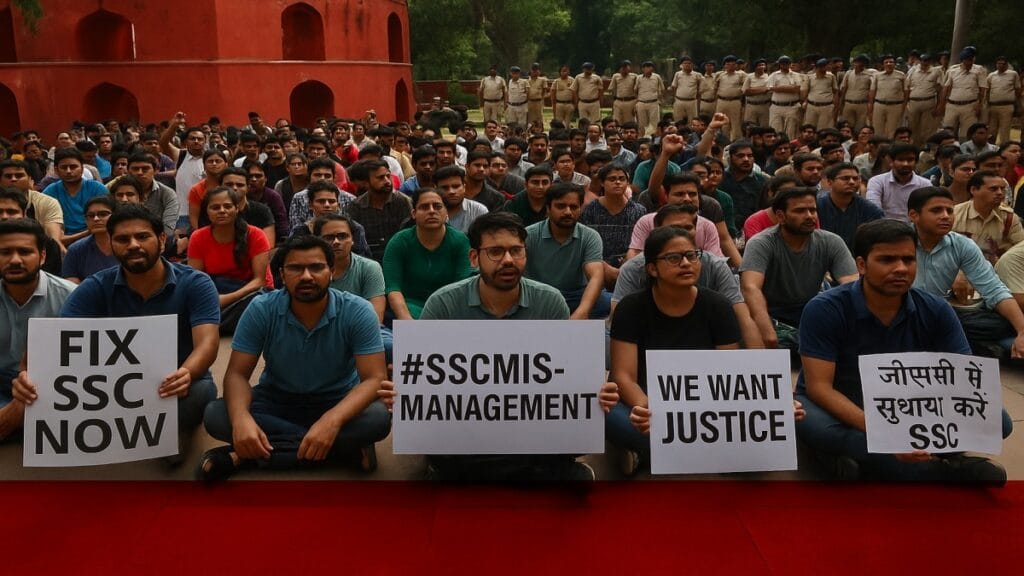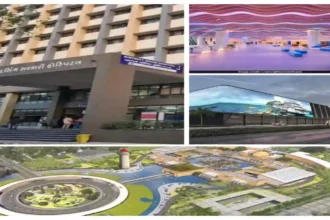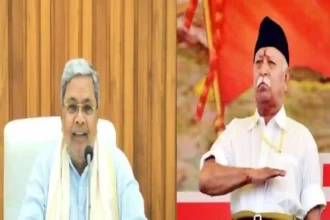
In a major development that has sparked widespread outrage across the country, thousands of candidates and educators gathered at Delhi’s Jantar Mantar to protest against the alleged mismanagement by the Staff Selection Commission (SSC). What was intended to be a peaceful demonstration soon turned tense as police reportedly resorted to lathi charge (baton charge) against the protesting students and teachers. Videos from the protest site have gone viral, triggering massive support online and leading to the trending of #SSCMisManagement across social media platforms.
- What is the SSC Mismanagement Protest All About?
- Role of Educators: Teachers Join Students in Protest
- Police Action and Violation of Democratic Rights
- Why is #SSCMisManagement Trending?
- Recurring Problems with SSC
- Reactions from Political and Government Circles
- Demands of the Protestors
- Way Forward: Steps to Improve the Situation
- Conclusion
This article provides an in depth look at the SSC mismanagement controversy, the key concerns raised by aspirants, reactions from authorities, the role of educators, and the possible way forward.
What is the SSC Mismanagement Protest All About?
The Staff Selection Commission (SSC) is a premier recruitment body under the Government of India, responsible for conducting various exams for Group B and Group C posts in ministries and departments. Over the years, SSC has faced criticism for administrative delays, technical glitches, and exam irregularities, but the events of July and August 2025 have taken the unrest to new heights.
The immediate trigger was the SSC Selection Post Phase 13 Examination 2025, held between July 24 and August 1. Candidates reported a slew of issues including:
- Sudden cancellation of exams without prior notice.
- Repeated technical glitches during online exams.
- Inaccessible exam centers and mismanagement on site.
- Alleged paper leaks and data breaches.
- Zero accountability from SSC officials.
Frustrated by these recurring issues, thousands of aspirants converged in Delhi under the banner of #DelhiChalo movement to demand justice and reform in the recruitment process.
Role of Educators: Teachers Join Students in Protest
The protest gained momentum when prominent educators and coaching faculty joined hands with the students. Notable figures like Neetu Singh, a respected SSC mentor with a large student following, were seen at the protest site.
Educators alleged that:
- The system was failing the hardworking youth of India.
- Students who prepared for years were being denied a fair chance.
- The exam infrastructure was unreliable and riddled with corruption.
- Government apathy toward such a crucial recruitment process was dangerous.
The presence of teachers lent credibility and emotional weight to the protests, making it not just a student movement but a national call for administrative reform.
Police Action and Violation of Democratic Rights
On July 31, 2025, the protest took a disturbing turn when police personnel reportedly carried out lathi-charge to disperse the demonstrators at Jantar Mantar and CGO Complex, despite the protest being non-violent.
Eyewitnesses and viral footage indicate:
Students being dragged and hit with batons.
Several candidates sustaining injuries.
Detention of educators and student leaders.
Seizure of protest materials and placards.
Human rights advocates and opposition leaders have condemned the police action as a gross violation of democratic rights and freedom of expression.
Why is #SSCMisManagement Trending?
The hashtag #SSCMisManagement quickly became the top trend on X (formerly Twitter), Instagram, and other platforms, with lakhs of posts highlighting the plight of aspirants. Some viral messages include:
- “Four years of preparation, one paper leak future gone.”
- “Fix SSC before fixing students with batons.”
- “From JEE to SSC, mismanagement is India’s new exam system.”
The social media uproar is unprecedented in SSC’s history and indicates a severe trust deficit between the commission and the youth.
Recurring Problems with SSC
This is not the first time SSC has been under fire. Past controversies include:
2018 SSC CGL Paper Leak, leading to mass protests and legal battles.
2020 lockdown delays without clarity on exam rescheduling.
2023 computer based test glitches leaving thousands unable to submit answers.
Despite repeated assurances by the SSC and the Ministry of Personnel, reforms have been either cosmetic or too slow to instill confidence.
Reactions from Political and Government Circles
While the SSC has issued a brief statement claiming that “minor technical issues were handled” and “disruption caused by server overloads were beyond their control,” no apology or accountability has been accepted yet. Meanwhile:
Opposition parties have slammed the government for turning blind to SSC mismanagement.
Youth organizations are calling for a full judicial inquiry.
RTIs (Right to Information requests) have been filed to uncover contractual details with private exam vendors.
Even some ruling party MPs have reportedly expressed concern, urging the government to act before the situation spirals further.
Demands of the Protestors
The students and educators are putting forth the following demands:
1. Judicial or CBI monitored probe into SSC mismanagement and alleged corruption.
2. Immediate rescheduling of cancelled exams without additional fees.
3. Penal action against exam contractors found guilty of technical failures.
4. Transparent communication from SSC with daily updates.
5. Compensation or additional attempts for candidates affected by system errors.
6. Legal reforms to make SSC accountable under service level agreements (SLAs).
Way Forward: Steps to Improve the Situation
To prevent such chaos in the future and restore the credibility of SSC, the following steps are essential:
1. Digital Infrastructure Overhaul: SSC must invest in secure, scalable, and real-time exam platforms. Independent audits of IT vendors should be made public to prevent data leaks and exam glitches.
2. Third Party Monitoring: Engaging third-party exam observers, similar to election observers, can ensure fairness and transparency during exams.
3. Grievance Redressal Portal: A 24×7 official helpline and grievance portal should be established where students can file real time complaints and receive redressal within 48 hours.
4. Transparent Scheduling and Notifications: All exam related notifications, center changes, and admit card issues must be automated and auditable. Emergency helplines must be made functional during exam windows.
5. Accountability Clauses for Vendors: Any private firm managing exam logistics or platforms should be bound by legal contracts, and failures must lead to fines or blacklisting.
6. Legislative Oversight: A permanent parliamentary committee on recruitment reforms must be set up to monitor SSC and similar agencies like UPSC, RRB, and state boards.
Conclusion
The SSC mismanagement crisis has exposed the fragile state of India’s central recruitment systems and the alarming treatment meted out to young aspirants. These are not just students they are future administrators, tax officers, enforcement agents, and ministers. The least the system can offer them is fairness and respect.
Instead of silencing their voices through lathis and legal notices, the government must listen, act, and reform. If trust in institutions like SSC is lost, it will have a far reaching impact on India’s youth and governance.
The SSC mismanagement issue is not just a technical failure; it is a moral one. And it demands immediate and honest correction.
Stay Connected with The News Drill for more updates.
Contact us: contact@thenewsdrill.com
Submit a tip or share your story: editor@thenewsdrill.com

















